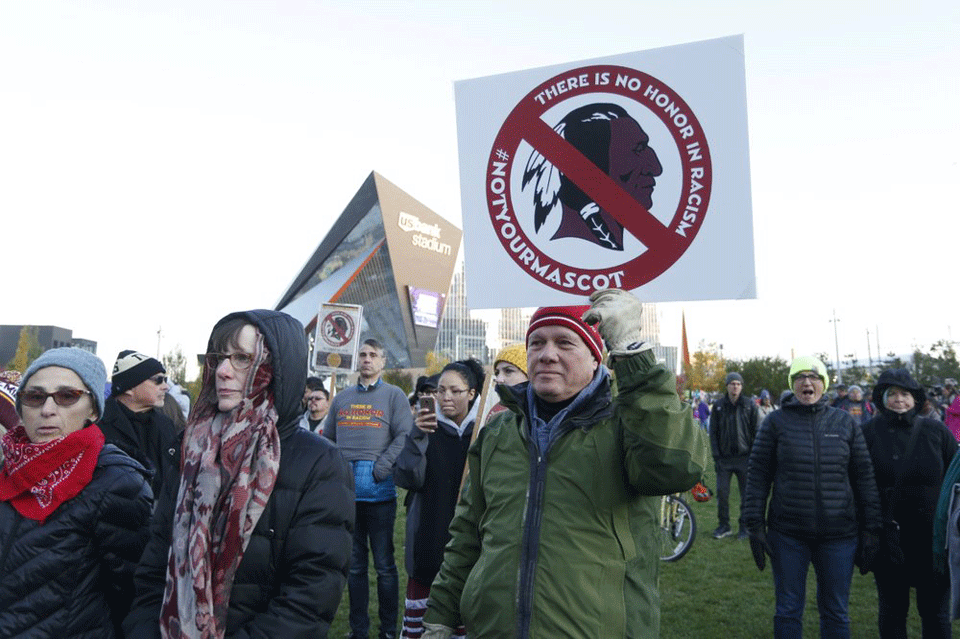
Note from the Sports Desk:
After decades of demonstrations, boycotts, calls to action, and even a skillfully executed digital direct action by Native Americans and Indigenous peoples organizations in December of 2017, Washington’s football team is dropping its racist name—a feat seemingly impossible with team owner Dan Snyder’s insistence that the name and logo would never change.
So yes, we should all breathe a sigh of relief. But let’s not kid ourselves, or shower the team’s leadership with applause and unnecessary adulation. This decision was not made out of goodness. It wasn’t made to correct a longstanding wrong, nor did the team ownership finally listen to the hundreds of thousands of Native voices and realize its mistake. Were that the case this change would have come sooner.
It was made out of fear. Fear of losing profit. Remember it wasn’t too long ago, July 2, that FedEx threatened to remove its signage from the team’s stadium after the 2020 season if the team didn’t change the name and logo—ending the $205 million naming rights deal FedEx signed with the team in 1999. And that’s a decent sum of money. An amount surely the team did not want to miss out on.
Funny how quickly some will act with dollars and cents are on the line.
Still, this is a win. And it’s due to the constant and admirable dedication of those Native activists who never stopped, never gave in to pressure, and never to no for an answer.
That’s just something to keep in mind when thinking about who deserves the credit in all this.
–AAN
WASHINGTON (AP) — The Washington NFL franchise announced Monday it is dropping the “Redskins” name and Indian head logo, bowing to recent pressure from sponsors and decades of criticism that they are offensive to Native Americans.
A new name must still be selected for one of the oldest and most storied teams in the National Football League, and it was unclear how soon that will happen. But for now, arguably the most polarizing name in North American professional sports is gone at a time of reckoning over racial injustice, iconography, and racism in the U.S.
The move came less than two weeks after owner Dan Snyder, a boyhood fan of the team who once declared he would never get rid of the name, launched a “thorough review” amid pressure from sponsors. FedEx, Nike, Pepsi, and Bank of America all lined up against the name, which was given to the franchise in 1933 when the team was still based in Boston.
The team said it is “retiring” the name and logo and that Snyder and coach Ron Rivera are working closely to develop a new moniker and design. The announcement came on the old letterhead with the Redskins name because the team technically retains it until a new one is chosen and approved.
Native American advocates and experts have long criticized the name they call a “dictionary-defined racial slur.” Over a dozen Native leaders and organizations wrote to NFL Commissioner Roger Goodell last week demanding an immediate end to Washington’s use of the name. Goodell, who has fielded questions on the topic for years, said he supported the review.
Protests against the name predate Snyder buying the team in 1999, and, until now, he had shown no willingness to consider a change. Strong words from sponsors — including a company run by a minority stakeholder of the team — changed the equation.
FedEx earlier this month became the first sponsor to announce it had asked the organization to change the name, particularly important because CEO Frederick Smith owns part of the team. FedEx paid $205 million for the long-term naming rights to the team’s stadium in Landover, Maryland.
The lease at FedEx Field expires in 2027, and dropping the name keeps open various possibilities in Maryland, Virginia, and Washington for the team’s new stadium and headquarters. District of Columbia Mayor Muriel Bowser has said the name was an “obstacle” to Snyder building on the old RFK Stadium site, which is believed to be his preference.
The team recently started cutting ties with racist founder George Preston Marshall, removing his name from the Ring of Fame and renaming the lower bowl at FedEx Field for the team’s first Black player, late Hall of Famer Bobby Mitchell. Marshall, who renamed the Boston Braves the Redskins in 1933 and moved the team to D.C. four years later, was a segregationist and the last NFL owner to integrate his team. The current logo shows the profile of a red-faced Native American with feathers in his hair.
Major League Baseball’s Atlanta Braves and the National Hockey League’s Chicago Blackhawks have said they are not inclined to change their names. Some advocates would like to see all Native American names, mascots, and imagery out of sports.
Long removed from the glory days of winning Super Bowl titles in the 1982, 1987 and 1991 seasons under coach Joe Gibbs, Washington’s NFL team has just five playoff appearances in 21 years and no postseason victories since 2005. The team has lacked a nationally marketable player since Robert Griffin III’s short-lived stardom, and the 2020 schedule features zero prime-time games for a franchise that used to be a draw.
Re-branding with a new name and logo — and perhaps the same burgundy and gold colors — coupled with turning football operations over to Rivera could be a boon for Snyder on and off the field. Even if a segment of the fan base opposes the change in the name of tradition, winning would more than make up for those losses.












Comments